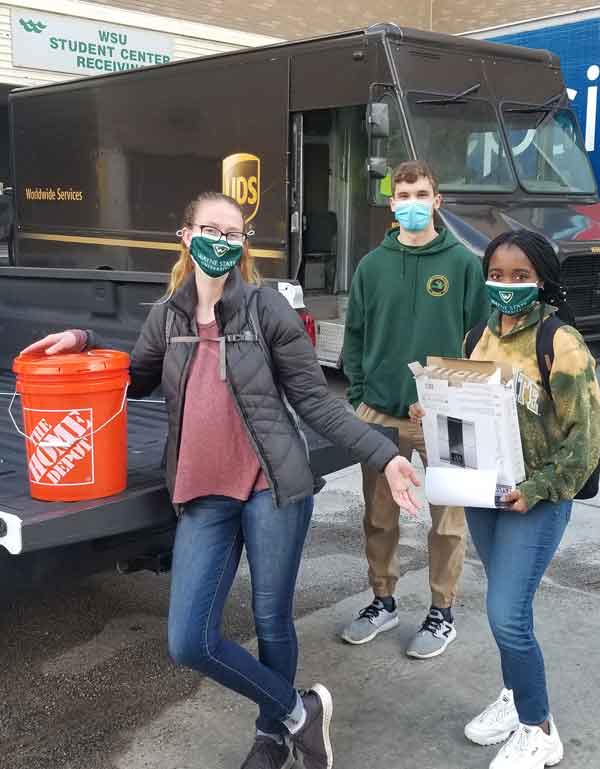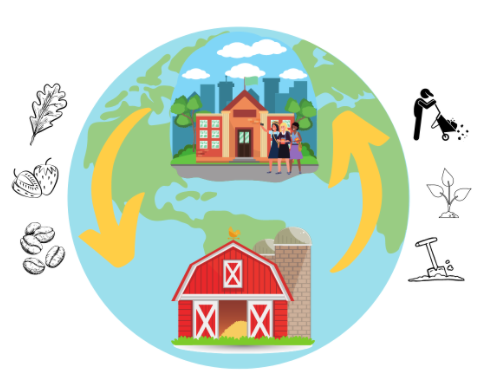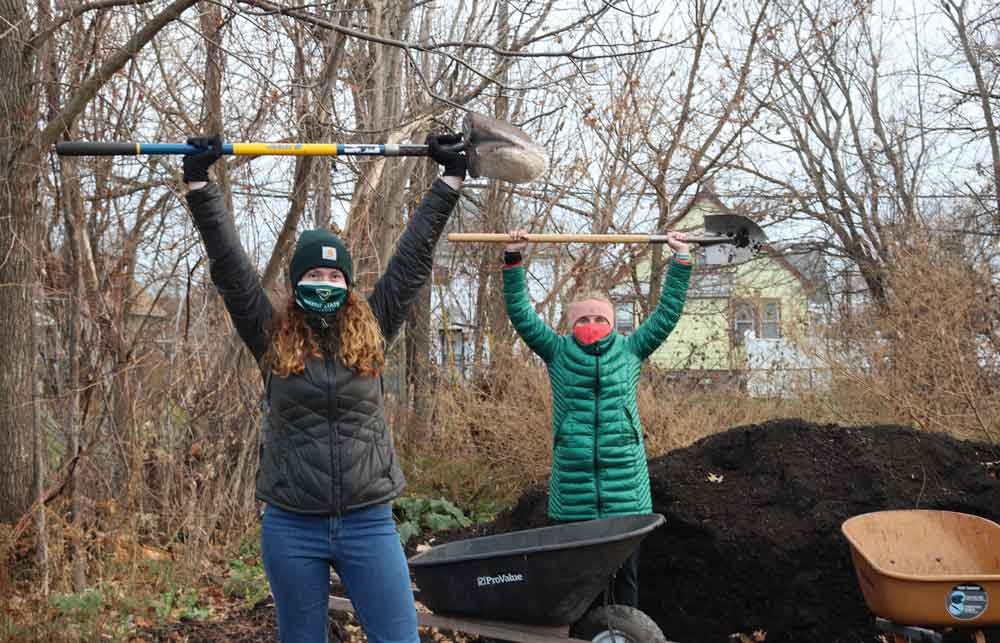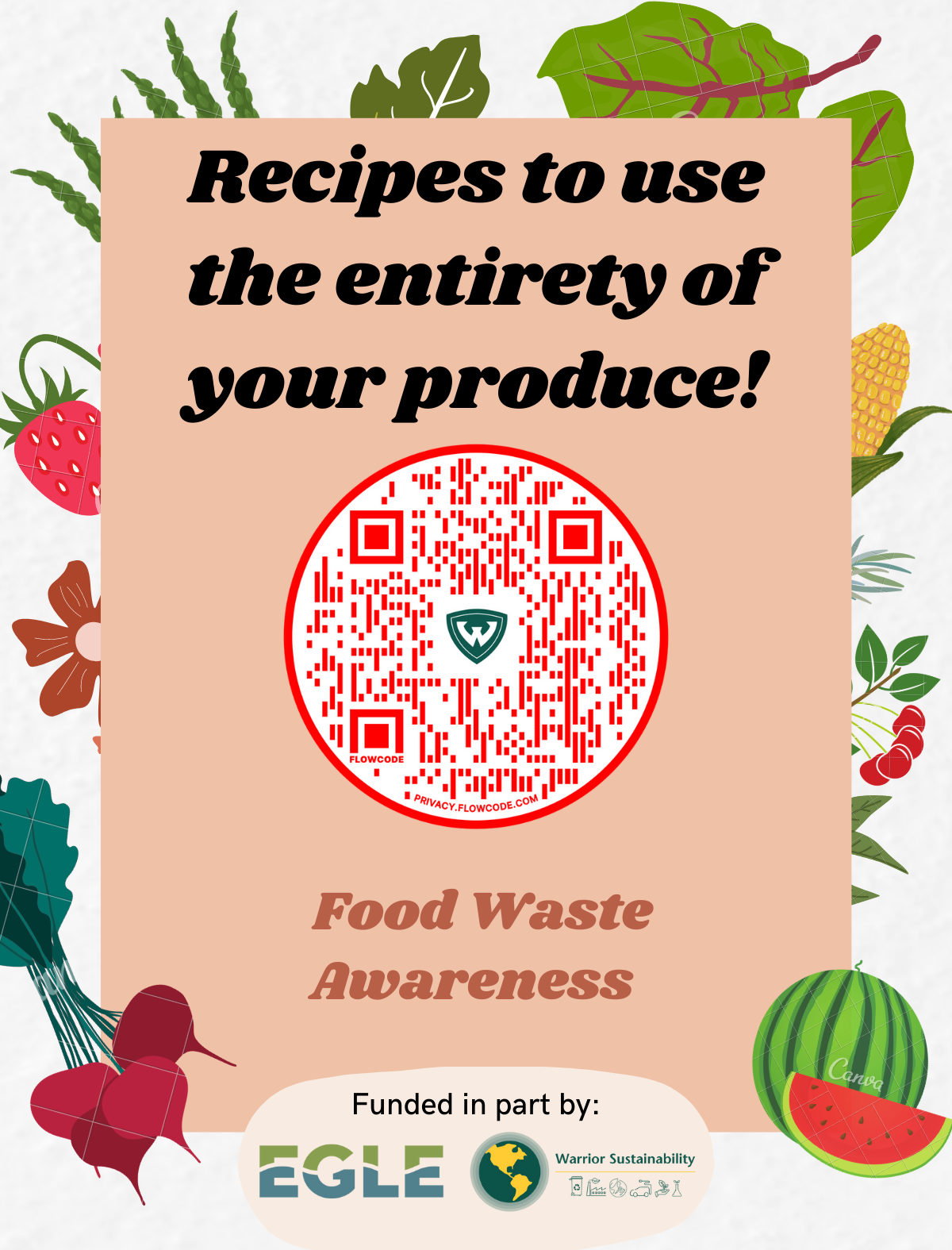Compost Pilot Program
 Wayne State University is dedicated to reducing our greenhouse gas emissions and one of the best ways to do this is by composting! Composting prevents compostable material from rotting in landfills and emitting methane, one of the earth's most potent greenhouse gases.
Wayne State University is dedicated to reducing our greenhouse gas emissions and one of the best ways to do this is by composting! Composting prevents compostable material from rotting in landfills and emitting methane, one of the earth's most potent greenhouse gases.
The Office of Campus Sustainability is leading WSU's Compost Pilot, a program which is distinct from those seen at other universities as it implements a closed-loop food system. The program involves collection and delivery of compostable materials from campus to nearby urban farms. From there, the farm controls the composting process to produce finished compost, a nutrient rich soil amendment, which is used to grow food on the farm and also brought back to the University for use in landscaping and the campus greenhouse.
What can be composted:
- Fruits
- Vegetables

- Coffee grounds
- Biodegradable food ware
- Napkins
- Color free cardboard no larger than hand size
Frequently asked questions
- Why is composting important? Composting reduces the amount of organic material sent to landfills by reusing it. The life cycle of organics allows for food to grow, the food scraps to be composted, and the compost to be used to grow more food.
- Where does the food waste go? Through our campus partners (Dining Services & Ground Services), we collect organic waste and transport it to our partner facility, Georgia Street Community Collective, where the compost process will take place. Once the compost is finished, it will be brought back to WSU for Grounds Services and for the campus greenhouse.
- Can I compost at home? Absolutely! In fact, that is one of the leading ways you can live sustainably at the residential level. All you need to add to your compost pile is browns (dead leaves, branches, paper), greens (food scraps, coffee grounds, grass clippings), and water! Don't have a yard? There are also convenient indoor/countertop composting methods.
- What is/ is not compostable? A big question folks have that holds back the composting program is "can this be composted?" And yes, this can be tricky. Most all fruits and vegetables are totally safe for compost, but you may want to stay away from dairy or meat products (even though these are food scraps). A general list of things to avoid include: diseased plants or weeds, pet waste, dairy products, meat or fish bones and scraps, chemical pesticides. This will reduce the odor, reduce pest and rodent attraction, and will ensure harmful chemicals will not destroy beneficial organisms.
- How can I get involved at WSU? Beyond this website, you can find us on Instagram @warriorsustainability for more educational resources and other forms of sustainability on campus you can get involved in as well!
- I live in the residence halls, can I bring my compostable materials from home? In the future, we plan to add a community drop-off site on campus where students, faculty, and staff could bring their compostable materials while on campus. Stay tuned for more info on this in the future!

Our Program Partners:
-
Georgia Street Community Collective:
-
Mark & Lorraine Covington - Mark and Lorraine are the mother/son duo that started GSCC and do all the upkeep on the grounds. Mark grew up and still lives in his childhood home just half-a-block away from the collective, meaning he's there pretty much all the time!
-
GSCC was started by Mark Covington in November of 2008 with the intention of creating a community garden center where residents could come and plant, harvest, and develop the area further to support their community with food in times of need. Since then, it has grown into a large scale operation with multiple gardens, green house area, a fruit orchard, and a community center for enrichment and learning. But, Mark is still expanding! He is working to innovate the compost system where we deliver our campus organic waste as well as a community composting site where neighborhood residents can be engaged.
-
You can find more information on the Georgia Street Community Collective here on their website.
-
-
Food Plus Detroit:
-
Renee Wallace - Renee is a well known visionary and business woman. She runs her own consulting alliance known as Doers Consulting Alliance LLC, and she was brought on by Food Plus Detroit in 2013 as their primary Detroit program manager. Since then, she has sky-rocketed FPDs success in developing efficient community food systems.
-
Food Plus Detroit is a networked innovation coalition established to facilitate and accelerate implementation of innovative food, agriculture and related resources projects. Its mission is to facilitate and accelerate a more sustainable metropolitan food system by engaging in innovation, research, experimentation and learning. Their hope by working on projects in Detroit is to envision a metropolitan food system that produces, processes and distributes food that is abundant, safe, healthy, affordable and accessible, while conserving energy, water and soil, opening economic opportunities for the many and enhancing diversity and social justice in the community.
-
You can find more information on Food Plus Detroit here on their website.
-
-
WSU's Grounds Services:
-
Mike Bernal - Mike is the Associate Director of Grounds Services and has contributed many resources that have been essential to the success of the Compost Pilot Program
-
Grounds Services are responsible for the upkeep and maintenance of outdoor spaces on Wayne State's campus. Their mission is to provide a safe, attractive, well-maintained environment to support the University's drive for excellence. Through effective planning, management, and teamwork, they strive to make continuous improvements and meet the expectations of our stakeholders, students, faculty, staff, and visitors. They have been working hard to deliver leaves and other vegetative trimmings to the farm to ensure they have a sufficient source of carbon for the composting process.
-
You can find more information on WSU's Grounds Services here on their website.
-
-
WSU Dining Services:
-
Chef John Borso, Megan Pilkington, and Dining Services staff have been working diligently to implement an efficient food collection process and spread the word about why reducing food waste is so important!
-
WSU Dining Services handles all Wayne State backed dining opportunities on campus. These include Towers Cafe, Gold n' Greens, the Student Center Food court (Taco Bell, Panda Express, Starbucks, Midtown Market), Beyond Juicery, and Fourteen East. They are dedicated to maintaining a high standard of product, using only the freshest, local ingredients possible, whilst also accommodating food allergies, preferences, and special dietary needs. They are also interested in upholding environmentally friendly and efficient practices by utilizing waste minimization, transportation management, and responsible sourcing.
-
You can find more information on WSU's Dining Services here on their website.
-
